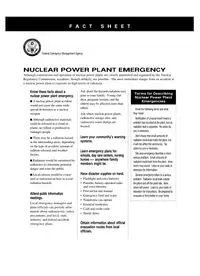Table Of ContentF A C T S H E E T
NUCLEAR POWER PLANT EMERGENCY
Federal Emergency Management Agency
Terms for Describing
Nuclear Power Plant
Emergencies
Know the following terms and what
they mean:
Notification of unusual event means a
problem has occurred at the plant, but no
radiation leak is expected. No action by
you is necessary.
Alert means that small amounts of
radiation could leak inside the plant, but
it will not affect the community. No
action by you is necessary.
Site area emergency describes a more
serious problem. Small amounts of
radiation could leak from the plant. Area
sirens may sound. Listen to your radio or
television for information.
General emergency refers to a serious
problem. Radiation could leak outside
the plant and off the plant site. Area
sirens will sound. Listen to your radio or
television for instructions. Be prepared to
evacuate or find shelter in your home.
Although construction and operation of nuclear power plants are closely monitored and regulated by the Nuclear
Regulatory Commission, accidents, though unlikely, are possible. The most immediate danger from an accident at
a nuclear power plant is exposure to high levels of radiation.
Know these facts about a
nuclear power plant emergency.
I A nuclear power plant accident
would not cause the same wide-
spread destruction as a nuclear
weapon.
I Although radioactive materials
could be released in a cloud or
plume, no fallout is produced to
endanger people.
I There may be a radiation hazard
in the surrounding areas, depending
on the type of accident, amount of
radition released, and weather
factors.
I Radiation would be monitored by
authorities to determine potential
danger and warn the public.
I Local citizens would be evacu-
ated or instructed on how to avoid
radiation hazards.
Attend public information
meetings.
Local emergency managers and
plant officials can provide infor-
mation about radioactivity; safety
precautions; and local, state,
industry, and federal accident
emergency plans.
Ask about the hazards radiation may
pose to your family. Young chil-
dren, pregnant women, and the
elderly may be affected more than
others.
Ask where nuclear power plants,
radioactive storage sites, and
radioactive waste dumps are
located.
Learn your community’s warning
systems.
Learn emergency plans for
schools, day care centers, nursing
homes — anywhere family
members might be.
Have disaster supplies on hand.
• Flashlight and extra batteries
• Portable, battery-operated radio
and extra batteries
• First aid kit and manual
• Emergency food and water
• Nonelectric can opener
• Essential medicines
• Cash and credit cards
• Sturdy shoes
Obtain information about official
evacuation routes from local
officials.
EMERGENCY PUBLIC INFORMATION
Be prepared to evacuate or
find shelter in your home.
Develop an emergency commu-
nication plan.
In case family members are
separated from one another during
a disaster (a real possibility during
the day when adults are at work
and children are at school), have a
plan for getting back together.
Ask an out-of-state relative or
friend to serve as the “family
contact.” After a disaster, it’s
often easier to call long distance.
Make sure everyone knows the
name, address, and phone number
of the contact person.
Listen to a battery-operated
radio or television for official
information. Not all nuclear
power plant incidents result in
the release of radiation.
If advised to remain at home:
I Bring pets inside.
I Close and lock windows and
doors.
I Turn off air conditioning, vents,
fans, and furnace.
I Close fireplace dampers.
I Go to the basement or other
underground area.
I Stay inside until authorities say
it is safe.
I If you must go out, cover mouth
and nose.
When coming in from outdoors:
I Shower and change clothing
and shoes.
I Put items worn outdoors in a
plastic bag and seal it.
If advised to evacuate:
I Listen to a radio or television
for information on evacuation
routes, temporary shelters, and
procedures.
I Minimize contamination in
house.
I Close and lock windows and
doors.
I Turn off air conditioning, vents,
fans and furnace.
I Close fireplace dampers.
I Take disaster supplies.
Remember your neighbors who
may require special assistance
— infants, elderly people, and
people with disabilities.
After the Event
When the immediate danger has
passed, avoid using foods from your
garden or milk from cows or goats
until they can be inspected by local
emergency officials. Remember that
contamination can affect areas many
miles from the accident site.
September 1993
Three Ways to Minimize
Radiation Exposure
There are three ways to minimize
radiation exposure to your body:
Distance — The more distance
between you and the source of the
radiation, the less radiation you will
receive. In a serious nuclear accident,
local officials will likely call for an
evacuation, thereby increasing the
distance between you and the radiation.
Shielding — Like distance, the more
heavy, dense materials between you
and the source of the radiation, the
better. This is why local officials could
advise you to remain indoors if a
radiological accident occurs. In some
cases, the walls in your home would be
sufficient shielding to protect you.
Time — Most radioactivity loses its
strength fairly quickly. Limiting the
time spent near the source of radiation
reduces the amount of radiation you will
receive. Following a radiological
accident, local authorities will monitor
any release of radiation and determine
when the threat has passed.
Emergency
Response Plans
Federal, state, and local officials work
together to develop emergency response
plans for nuclear power plants and
surrounding communities. These plans
are tested through emergency exercises
that can include small-scale evacuation
drills for public institutions such as schools
and nursing homes.

